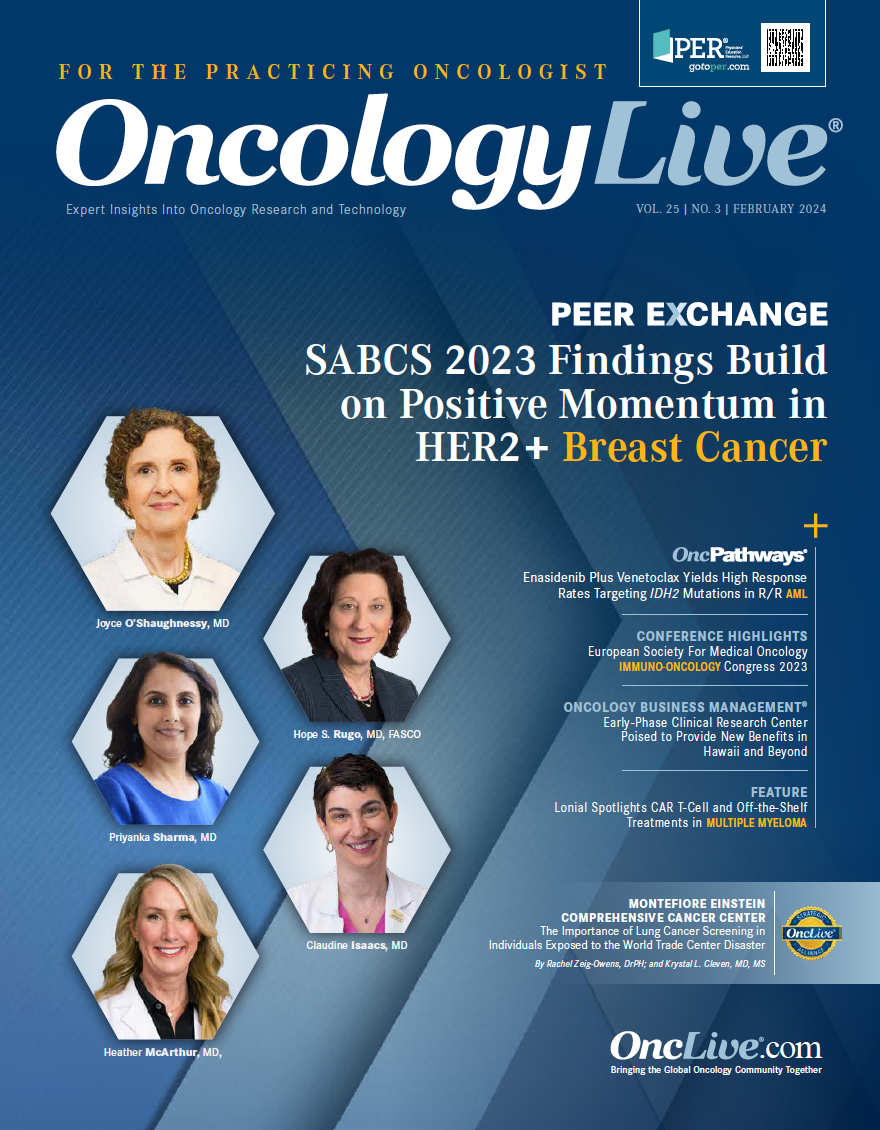Actionable Molecular Findings: Increasingly Clinically Relevant but Also Increasingly Complex
Maurie Markman, MD, discusses the need for a decision support strategy to assist oncologists in treatment selection for patients with actionable mutations.
Maurie Markman, MD

The term actionable as applied to observed germline or somatic molecular events in patients with cancer may be a relatively new component of care, but its origins are as old as the initial forays into the management of malignant disease. The performance of oophorectomies beginning more than 100 years ago in premenopausal women with advanced or metastatic breast cancer was based on clinical evidence of often quite meaningful tumor regressions, symptomatic relief, and evidence of improved outcomes.1 Discovery of the presence and relevance of the estrogen receptor on breast cancer cells improved the ability to select the appropriate patient population for this surgical intervention as well as the evolving classes of systemic antineoplastic agents whose biologic and clinical activity was based (at least in part) on the presence and function of this molecular finding.
Evidence that the likelihood of clinical use of hormonal manipulations in breast cancer was based not only on the presence but also the extent of expression of the relevant receptor (estrogen, progesterone) and subsequent confirmation of this phenomenon for the HER2 receptor in this malignancy unfortunately led to the overly simplistic and incorrect assumption that the actionability of a targeted antineoplastic therapeutic could be easily determined by the degree of expression of the putative molecular biomarker. It is unknown how many billions of dollars were wasted by pharmaceutical/ biotechnology companies in both drug development and the conduct of early- and late-stage clinical trials based on the faulty assumption that the mere overexpression of an otherwise normal growth factor (eg, EGFR) somehow automatically converted that biological process into a relevant molecular target for an antineoplastic agent.2-4
Of course, it is now well appreciated that the precision medicine therapeutic paradigm dramatically changed when it was recognized that actionability related to the EGFR receptor in lung cancer was related to the demonstrated presence in an individual patient’s cancer of specific molecular aberrations within that receptor rather than simply its overexpression compared with normal lung tissue.5,6
This observation as well as objectively transformative changes in the technology associated with the assessment of unique molecular changes (time required to obtain results of potentially actionable abnormalities, cost of individual or panel molecular testing) have led to a revolution in our understanding of the basic biology of cancer, how cancers change over time, and an acceleration in pharmaceutical strategies to target these drivers of malignant growth and progression.
As previously noted, in the early days of cancer therapy and long before the introduction of the expression actionable, there were objectively few settings where knowledge of the presence of a unique target (to select a specific antineoplastic agent [eg, hormonal therapy]) was clinically relevant. Until quite recently, systemic treatments for advanced, metastatic, or recurrent cancers employed more nonspecific cytotoxic strategies, with the choice of agents based on in vitro and in vivo drug sensitivity testing and the subsequent conduct of clinical trials (phase 1-3).
Following the introduction of modestly large molecular panel testing, it was not uncommon for commercial vendors to employ the term actionable in marketing claims of the use of their product. Unfortunately, a large percentage of what was defined as actionable referred to limited published data (or only meeting abstracts) on a small population of individuals who may have achieved a degree of clinical benefit with the delivery of a non–FDA approved drug for the patient’s tumor type against the target in question (or a possibly related molecular target), the existence of findings from a potentially relevant clinical trial (phase 1-3) that might have been available somewhere in the United States, or even promising preclinical data (in the absence of human experience) regarding the target and a particular agent. Surely, such an expansive definition of the term actionable regarding a clinically relevant antineoplastic therapeutic for a given patient might be legitimately questioned.
However, that era is over. Today, based on the truly impressive efforts of academic investigators working independently or within large programs, the pharmaceutical/biotechnology industry, and the support of drug regulatory agencies (the FDA in the United States), an ever increasing percentage of individuals who undergo large panel molecular testing (next-generation sequencing) or an even more extensive evaluation of the molecular biology of an individual cancer have a finding that is objectively and meaningfully actionable regarding existing evidence that the patient may attain clinical benefit.
Consider, for example, a recent published report regarding the potential favorable impact of several antineoplastic agents whose FDA approval is completely agnostic to the site of origin of the cancer and where drug delivery is based on the presence of a particular target (actionable molecular abnormality).7
Although this paradigm change is unquestionably an important development for patients with cancer, the increasing complexity of this arena cannot be overstated. How are busy oncologists caring for patients with a wide spectrum of diseases in their clinical practices going to keep abreast of the multiple advances in this arena and be fully aware of the details of new drug approvals for unique disease-specific molecular subtypes or tumor-agnostic indications? For example, this commentary previously highlighted the relevance of the presence of EGFR mutations in defining a group of patients with lung cancer whose malignancy would be responsive to an agent capable of both targeting and inhibiting the biological function of this growth factor. Recently reported trials have emphasized the clinical use of agents specifically targeted to unique mutations present within the tumors of patients with lung cancer.8,9 With each exciting development, the need for a truly robust decision support strategy to assist oncologists in their selection of optimal treatment for patients becomes ever more palpable.
References
- Ben-Dror J, Shalamov M, Sonnenblick A. The history of early breast cancer treatment. Genes (Basel). 2022;13(6):960. doi:10.3390/genes13060960
- Giaccone G, Herbst RS, Manegold C, et al. Gefitinib in combination with gemcitabine and cisplatin in advanced non-small-cell lung cancer: a phase III trial--INTACT 1. J Clin Oncol. 2004;22(5):777-784. doi:10.1200/JCO.2004.08.001
- Herbst RS, Giaccone G, Schiller JH, et al. Gefitinib in combination with paclitaxel and carboplatin in advanced non-small-cell-lung cancer: a phase III trial--INTACT 2. J Clin Oncol. 2004;22(5):785-794. doi:10.1200/JCO.2004.07.215
- Vergote IB, Jimeno A, Joly F, et al. Randomized phase III study of erlotinib versus observation in patients with no evidence of disease progression after first-line platin-based chemotherapy for ovarian carcinoma: a European Organisation for Research and Treatment of Cancer-Gynaecological Cancer Group, and Gynecologic Cancer Intergroup study. J Clin Oncol. 2014;32(4):320-326. doi:10.1200/ JCO.2013.50.5669
- Paez JG, Jänne PA, Lee LC, et al. EGFR mutations in lung cancer: correlation with clinical response to gefitinib therapy. Science. 2004;304(5676):1497-1500. doi:10.1126/science.1099314
- Lynch TJ, Bell DW, Sordella R, et al. Activating mutations in the epidermal growth factor receptor underlying responsiveness of non-small-cell lung cancer to gefitinib. N Engl J Med. 2004;350(21):2129-2139. doi:10.1056/NEJMoa040938
- Gouda MA, Nelson BE, Buschhorn L, Wahida A, Subbiah V. Tumor-agnostic precision medicine from the AACR GENIE database: clinical implications. Clin Cancer Res. 2023;29(15):2753-2760. doi:10.1158/1078-0432.CCR-23-0090
- Planchard D, Jänne PA, Cheng Y, et al; FLAURA2 Investigators. Osimertinib with or without chemotherapy in EGFR-mutated advanced NSCLC. N Engl J Med. 2023;389(21):1935-1948. doi:10.1056/ NEJMoa2306434
- Zhou C, Tang KJ, Cho BC, et al; PAPILLON Investigators. Amivantamab plus chemotherapy in NSCLC with EGFR exon 20 insertions. N Engl J Med. 2023;389(22):2039-2051. doi:10.1056/NEJMoa2306441




